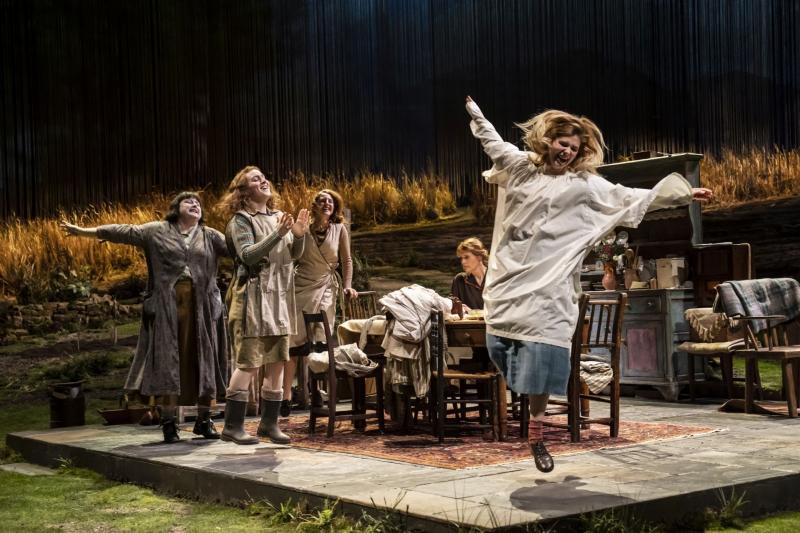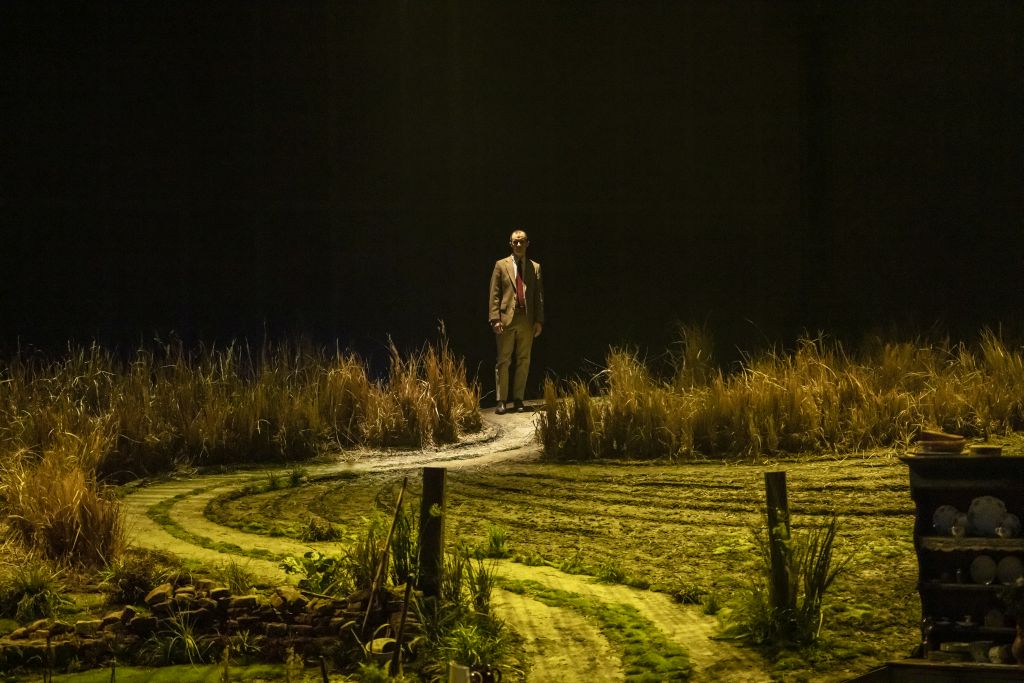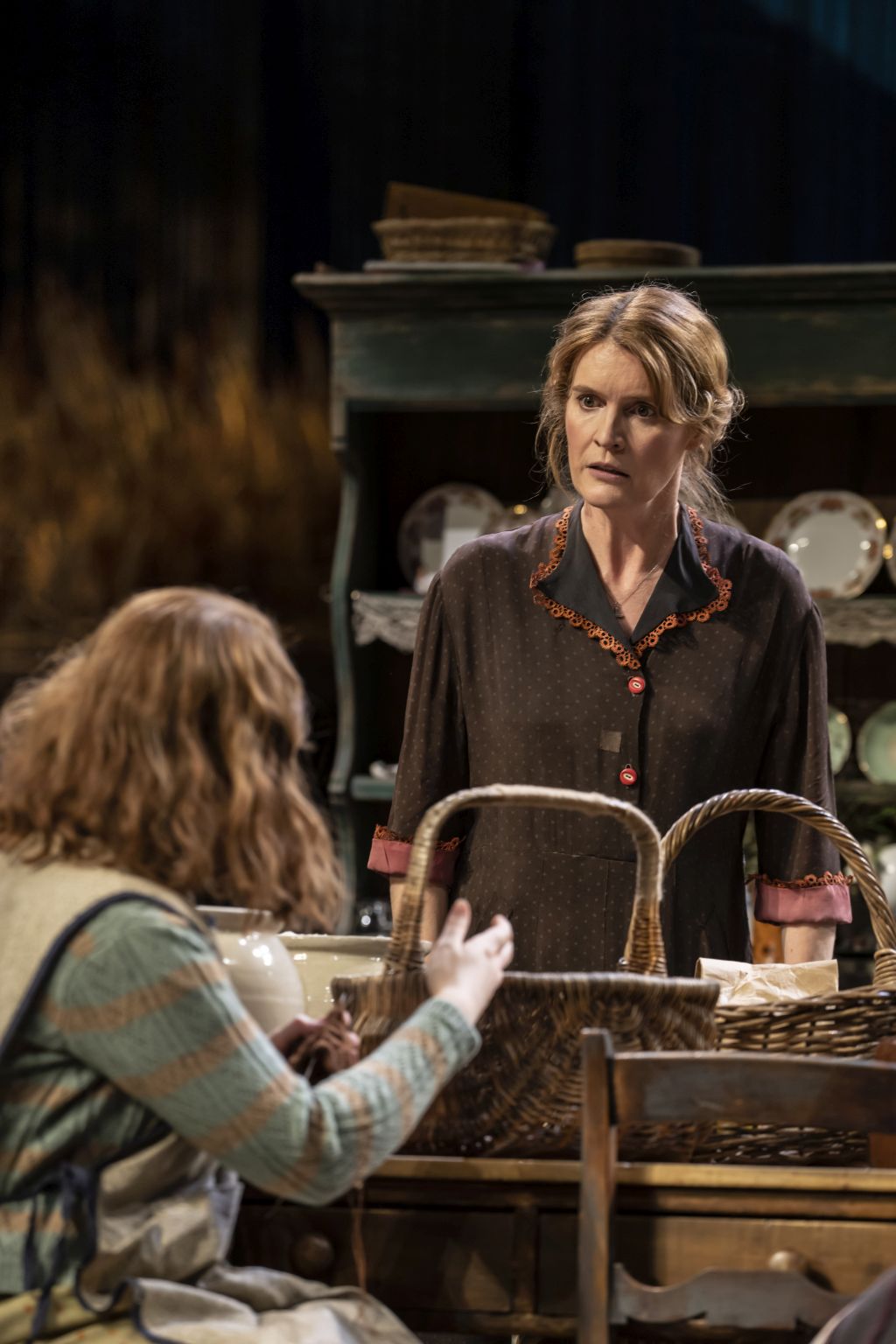Dancing at Lughnasa, National Theatre review - largely ravishing Brian Friel revival | reviews, news & interviews
Dancing at Lughnasa, National Theatre review - largely ravishing Brian Friel revival
Dancing at Lughnasa, National Theatre review - largely ravishing Brian Friel revival
Modern-day classic returns to the building where it was first seen in London

It's saying a lot when a production lives up to its gasp-inducing set. That's the happy case with Josie Rourke's loving revival of Dancing at Lughnasa, which returns Brian Friel's modern-day classic to the building, the National, where this Olivier and Tony Award-winner first played London over 32 years ago.
Upgraded this time round to the open expanse of the Olivier stage, the play occupies an Irish backwater from designer Robert Jones that seems to stretch to infinity and beyond, the vista defined by a striated stage curtain (it looks beaded, but isn't) itself suggesting the porousness of memory. The impression is a self-enclosed community that will be revealed to be hauntingly vulnerable to the world at large as we hear of five unmarried sisters during harvest season in County Donegal in the summer of 1936: the narrator is their nephew, Michael (the wonderful Tom Vaughan-Lawlor, pictured below), looking back with affection and anguish on a past that, you feel, continues to inform his present.  If that weren't the case, the play wouldn't exist, given the affinities between the rhapsodic wordsmith, Michael, and Friel himself, who has rooted Lughnasa in his own experience. I saw Patrick Mason's career-defining original production of this play in London, Dublin, and on Broadway, and its shimmering power has in no way been dimmed. This production may throw different aspects of the play into bold relief - the emphasis here is very much on oldest sister Kate and less so on the heartsick, ever-knitting Agnes (Brid Brennan won her own Tony for that performance) - but the play's sense of ectasy dampened down by circumstance, and worse, allows its putative intimacy to fill the reaches of the Olivier which, in fact, doesn't seat that many more than did Lughnasa's original Broadway berth.
If that weren't the case, the play wouldn't exist, given the affinities between the rhapsodic wordsmith, Michael, and Friel himself, who has rooted Lughnasa in his own experience. I saw Patrick Mason's career-defining original production of this play in London, Dublin, and on Broadway, and its shimmering power has in no way been dimmed. This production may throw different aspects of the play into bold relief - the emphasis here is very much on oldest sister Kate and less so on the heartsick, ever-knitting Agnes (Brid Brennan won her own Tony for that performance) - but the play's sense of ectasy dampened down by circumstance, and worse, allows its putative intimacy to fill the reaches of the Olivier which, in fact, doesn't seat that many more than did Lughnasa's original Broadway berth.
The play offers a snapshot of a particular time, both as lived and also as recollected. Michael ambles to and from centre-stage, like Friel's own version of Tennessee Williams's Tom, introducing us to the dynamics of the female household of his childhood (he was 7 in 1936) and letting us know the hand that fate would deal to these women in the sequel that Friel asks us to write for ourselves.
Michael has been born out of wedlock to Chris (Alison Oliver), following a fling with a Welsh charmer, Gerry Evans, who reappears now and again to tease the sisters with his presence: Agnes (Louisa Harland) harbors her own affections for Gerry, whom we soon discover responds mostly to the gift of his own gab. Tom Riley plays the role with no discernible Welsh accent but with lots of peculiar affectations as if this new recruit to the Spanish civil war were instead hellbent on a career impersonating Charlie Chaplin. Chris has the measure of the man when she calls him a "bluffer", only for Gerry to appeal his cause to the adoring Agnes, whom he takes for a spin to the music of Cole Porter.
Their duet to the tune of "Anything Goes" is an important dance break. The more celebrated one in this play is the extraordinary scene in the first act in which the women, singly but then collectively, succumb to the ceili band whose sounds come pouring forth from their dodgy Marconi - the family's first wireless. Leading the frenzied charge is the ever-playful quipster Maggie (Siobhán McSweeney), whose heartiness exists a beat away from the heartache she has known.
 Soon, even the assertively "proper" Kate (Justine Mitchell, splendid, pictured right) is letting loose, the siblings caught up in an ecstatic surrender that finds them careering about the stage even once the clamorous sounds have stopped. Youngest sister Rose (an engaging Bláithín Mac Gabhann), the "simplest" Mundy sibling, clomps about gaily in her Wellington boots, not yet knowing that her beloved white rooster will before long be dead. Disappointment is this play's flipside to rapture, and the sequence captivates afresh, even if Wayne McGregor's choreography has about it the feeling of a set piece that wasn't the case with Terry John Bates's spontaneous-seeming eruption of movement all those years ago.
Soon, even the assertively "proper" Kate (Justine Mitchell, splendid, pictured right) is letting loose, the siblings caught up in an ecstatic surrender that finds them careering about the stage even once the clamorous sounds have stopped. Youngest sister Rose (an engaging Bláithín Mac Gabhann), the "simplest" Mundy sibling, clomps about gaily in her Wellington boots, not yet knowing that her beloved white rooster will before long be dead. Disappointment is this play's flipside to rapture, and the sequence captivates afresh, even if Wayne McGregor's choreography has about it the feeling of a set piece that wasn't the case with Terry John Bates's spontaneous-seeming eruption of movement all those years ago.
The cessation of the music, which stops as abruptly as it began, finds a parallel in the narratives of some of the sisters, not least Kate, whose job as a schoolteacher is nearing an end, and also Agnes and Rose, whose home-knitting handiwork will soon be co-opted by factories. Mitchell movingly charts the cumulative stress that has come with being the family carer and transmits considerable warmth in a role (played by Meryl Streep in the film adaptation) that can founder on the shoals of sternness.
There is another man on view besides Gerry: the much fussed-over Uncle Jack (Ardal O'Hanlon, the Father Ted star in blinding form), who has returned after a quarter-century away at a leper colony in Uganda. While abroad, he has embraced a paganism that is shocking especially to Kate who wonders aloud "what has happened" to a household that, we learn, will soon cease to exist, Jack's mental confusion emblematic of a larger chaos to which the Mundys in varying ways will all succumb.
And yet the genius of this play is to enfold its sorrow in a profound, empathic embrace that acts most definitely as a homage to family members viewed throughout with fondness. You sense the indebtedness and love felt towards all these women and Rourke and her colleagues' share in those emotions, too. And when the cast sways in barely perceptible unison to Michael's closing monologue, you're caught up in a vision of reality filtered through illusion, language Friel's point of departure for that unknowable realm that exists beyond words.
rating
Share this article
The future of Arts Journalism
You can stop theartsdesk.com closing!
We urgently need financing to survive. Our fundraising drive has thus far raised £49,000 but we need to reach £100,000 or we will be forced to close. Please contribute here: https://gofund.me/c3f6033d
And if you can forward this information to anyone who might assist, we’d be grateful.

Subscribe to theartsdesk.com
Thank you for continuing to read our work on theartsdesk.com. For unlimited access to every article in its entirety, including our archive of more than 15,000 pieces, we're asking for £5 per month or £40 per year. We feel it's a very good deal, and hope you do too.
To take a subscription now simply click here.
And if you're looking for that extra gift for a friend or family member, why not treat them to a theartsdesk.com gift subscription?
more Theatre
 Ragdoll, Jermyn Street Theatre review - compelling and emotionally truthful
Katherine Moar returns with a Patty Hearst-inspired follow up to her debut hit 'Farm Hall'
Ragdoll, Jermyn Street Theatre review - compelling and emotionally truthful
Katherine Moar returns with a Patty Hearst-inspired follow up to her debut hit 'Farm Hall'
 Troilus and Cressida, Globe Theatre review - a 'problem play' with added problems
Raucous and carnivalesque, but also ugly and incomprehensible
Troilus and Cressida, Globe Theatre review - a 'problem play' with added problems
Raucous and carnivalesque, but also ugly and incomprehensible
 Clarkston, Trafalgar Theatre review - two lads on a road to nowhere
Netflix star, Joe Locke, is the selling point of a production that needs one
Clarkston, Trafalgar Theatre review - two lads on a road to nowhere
Netflix star, Joe Locke, is the selling point of a production that needs one
 Ghost Stories, Peacock Theatre review - spirited staging but short on scares
Impressive spectacle saves an ageing show in an unsuitable venue
Ghost Stories, Peacock Theatre review - spirited staging but short on scares
Impressive spectacle saves an ageing show in an unsuitable venue
 Hamlet, National Theatre review - turning tragedy to comedy is no joke
Hiran Abeyeskera’s childlike prince falls flat in a mixed production
Hamlet, National Theatre review - turning tragedy to comedy is no joke
Hiran Abeyeskera’s childlike prince falls flat in a mixed production
 Rohtko, Barbican review - postmodern meditation on fake and authentic art is less than the sum of its parts
Łukasz Twarkowski's production dazzles without illuminating
Rohtko, Barbican review - postmodern meditation on fake and authentic art is less than the sum of its parts
Łukasz Twarkowski's production dazzles without illuminating
 Lee, Park Theatre review - Lee Krasner looks back on her life as an artist
Informative and interesting, the play's format limits its potential
Lee, Park Theatre review - Lee Krasner looks back on her life as an artist
Informative and interesting, the play's format limits its potential
 Measure for Measure, RSC, Stratford review - 'problem play' has no problem with relevance
Shakespeare, in this adaptation, is at his most perceptive
Measure for Measure, RSC, Stratford review - 'problem play' has no problem with relevance
Shakespeare, in this adaptation, is at his most perceptive
 The Importance of Being Earnest, Noël Coward Theatre review - dazzling and delightful queer fest
West End transfer of National Theatre hit stars Stephen Fry and Olly Alexander
The Importance of Being Earnest, Noël Coward Theatre review - dazzling and delightful queer fest
West End transfer of National Theatre hit stars Stephen Fry and Olly Alexander
 Get Down Tonight, Charing Cross Theatre review - glitz and hits from the 70s
If you love the songs of KC and the Sunshine Band, Please Do Go!
Get Down Tonight, Charing Cross Theatre review - glitz and hits from the 70s
If you love the songs of KC and the Sunshine Band, Please Do Go!
 Punch, Apollo Theatre review - powerful play about the strength of redemption
James Graham's play transfixes the audience at every stage
Punch, Apollo Theatre review - powerful play about the strength of redemption
James Graham's play transfixes the audience at every stage
 The Billionaire Inside Your Head, Hampstead Theatre review - a map of a man with OCD
Will Lord's promising debut burdens a fine cast with too much dialogue
The Billionaire Inside Your Head, Hampstead Theatre review - a map of a man with OCD
Will Lord's promising debut burdens a fine cast with too much dialogue

Add comment